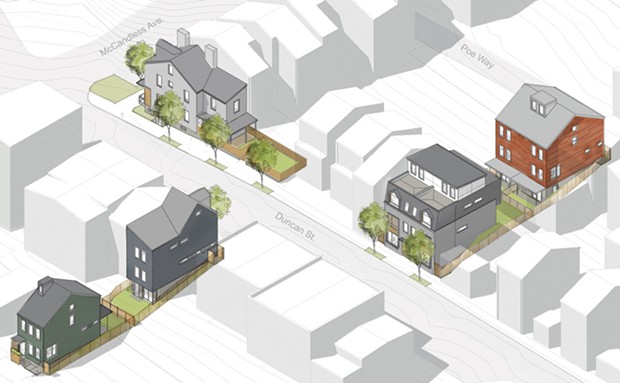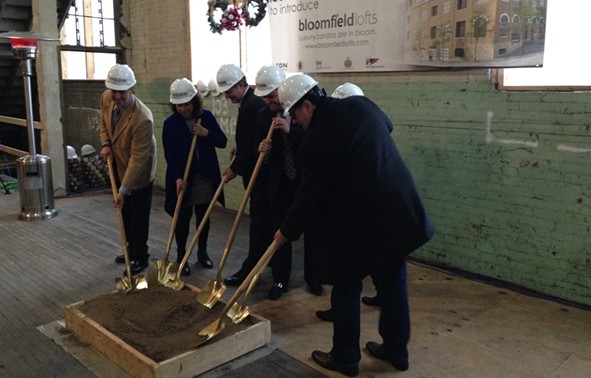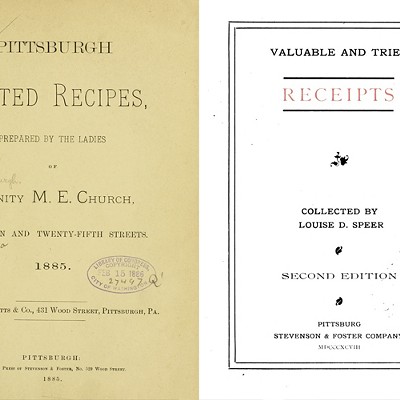Thursday, July 20, 2017
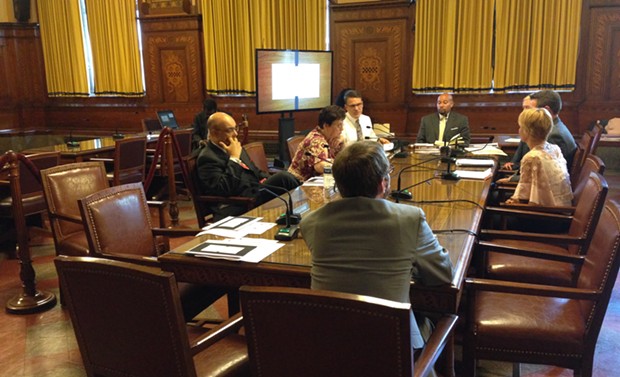
Tags: Daniel Lavelle , Dan Gilman , Theresa Kail-Smith , Pittsburgh City Council. Housing Opportunity Fund , Pittsburgh Community Redevelopment Group , Urban Redevelopment Authority , Realtors Association of Metropolitan Pittsburgh , Image
Thursday, July 6, 2017
As a response to this exploding market, the Lawrenceville Corporation knew it needed to do something bold. As City Paper reported in January 2016, Lawrenceville Corporation created the region’s first Community Land Trust (CLT), hoping to sell homes to low-income residents and to combat the neighborhood’s affordable-housing struggles. And last month, the group broke ground on its seven-property CLT.
“This is a direct and catalytic response by the Lawrenceville Corporation and our partners to the issue of housing insecurity. The neighborhood, through the award-winning Upper Lawrenceville Vision Plan, set 'housing for all' as a priority. … We are excited to be taking one more step in our disruptive, innovative approach to create housing that is permanently affordable,” said Lawrenceville Corporation director Matt Galluzzo in a press release.
CLTs maintain permanent affordability for the properties by having an entity (in this case, Lawrenceville Corporation) retain ownership of the land, but sell the homes to qualifying residents who earn 80 percent or less of the area’s average income — about $55,000 for a family of four. The homes in the Lawrenceville CLT will be sold for between $125,000 to $140,000 and will be constructed new or will be remodels.
Ed Nusser, of Lawrenceville Corporation, said in 2016 that CLTs allow homeowners to grow a limited amount of equity, but leaves them unable to sell the property to the highest bidder. Instead, Lawrenceville Corporation will manage the sale of the property to another low-income buyer. Nusser said that land-trust homeowners can make alterations to their properties and will otherwise have all the freedoms of a typical homeowner.
The properties will be located in upper Lawrenceville, near the corner of McCandless Avenue and Duncan Street. The CLT was funded by a variety of private and public entities, including Pittsburgh’s Urban Redevelopment Authority. Pittsburgh Mayor Bill Peduto has been supportive of the initiative.
“As a 21st-century city, we must have innovative out-of-the-box solutions to 21st-century issues. The City is proud to support Lawrenceville Corporation's CLT initiative — a direct implementation of the City's Affordable Housing Task Force recommendations with clear alignment with our p4 Performance Measures,” said Peduto spokesperson Katie O’Malley in a press release.
And the Pittsburgh Post-Gazette reported that there have already been 65 applications to purchase the Lawrenceville CLT homes. Lawrenceville Corporation says applications are still open online at the group's website.
Tags: Lawrenceville Corporation , Community Land Trust , Bill Peduto , Matt Galluzzo , Ed Nusser , Urban Revelopment Authority , Image
Wednesday, April 19, 2017
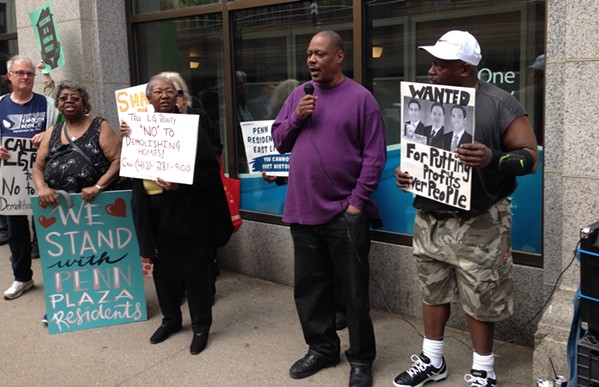
Instead, Pittsburgh Mayor Bill Peduto met with Penn Plaza residents, and more than 100 of them formed a tenant council to advocate for their rights. Soon after, a deal was reached that got move-out costs for the tenants and affordable-housing commitments from the city, in turn for allowing the developers, LG, to move forward with their plans.
But things started to go south for the developers after that. A fight over the public park next to Penn Plaza went in favor of the public, and the Pittsburgh Planning Commission voted 9-0 against the developers' plans because they said LG failed to collaborate with the community. Also, the major business tenant of the proposed Penn Plaza redevelopment, Whole Foods Market, pulled out.
Now, the affordable-housing advocates who have been rallying around the Penn Plaza saga, Homes For All Pittsburgh, want the city of Pittsburgh to purchase the remaining Penn Plaza building to preserve it as affordable housing and allow the tenants to own the building, like a co-op. The building, 5600 Penn Ave., is set to be demolished soon (the other building 5704 Penn Ave. was demolished in 2016).
Today, about 20 people held a rally on Smithfield Street, Downtown, demanding that Penn Plaza be sold to the city.
Pittsburgh, through the Pittsburgh Housing Authority, actually tried to purchase Penn Plaza back in 2015, but LG declined. Helen Gerhardt, of Homes for All, believes it is time to reconsider that plan.
"The city has an obligation to provide fair and affordable housing," says Gerhardt. "We want someone to own Penn Plaza who has that obligation."
Gerhardt says that in addition to providing affordable rents for low-income residents, tenant-owned buildings can have positive effects on residents, as they tend to provide some onsite jobs and social services that can help lift residents out of poverty. She cites success on the North Side, where the Northside Coalition for Fair Housing was able to purchase scattered sites and keep them affordable and tenant-owned. Gerhardt says Homes For All will continue to call out LG until it sells the building to the city.
Gerhardt also added she is grateful that the city and Pittsburgh City Council have taken steps to address affordable-housing issues, but says substantial affordable-housing legislation must come soon. She says she has spoken with developers who are on board with inclusionary zoning requirements, where developers set aside a certain percentage of units that maintain affordability. City council is currently considering creating a Housing Opportunity Fund, which would provide $10 million a year to pay for affordable-housing projects and provide more leverage for state and federal housing grants.
Gerhardt says more and more low-income Pittsburghers are being pushed out of their neighborhoods due to rising rents and its "absolutely" time for council to act on these proposals.
Tags: Penn Plaza , Homes for All Pittsburgh , LG Realty Advisors , Pittsburgh , Image
Thursday, March 9, 2017

Unfortunately for Pittsburghers of lower- and middle-income means, living in Eastside and Bond isn’t attainable; a one-bedroom apartment there starts a $1,900 and two-bedroom units start at $2,300. And a group of affordable-housing advocates are upset about it.
On March 9, more than 60 people filled the intersection at Centre and Penn avenue, in front of Eastside and Bond, to protest the lack of affordable housing at this complex and other new luxury apartment units that have been filling the area. In addition to the 360 units at Eastside and Bond, developer Walnut Capital has recently created 555 luxury units in the area.
The advocates placed furniture in the intersection to highlight how luxury apartments are making it harder for low-income residents to find affordable places to live in and around East Liberty. The group rallied for 35 minutes in the street. Some cars honked in anger, while other drivers gave thumbs ups. Pittsburgh Police officers eventually directed traffic around the rally, and let the rally-goers exit the street when they were finished.
Alethea Sims, of the Coalition of Organized Residents of East Liberty, says longtime East Liberty residents are leaving the neighborhood en masse, even when given a Section 8 subsidized housing voucher.
“We can take a voucher and go any place,” says Sims. “But why can’t we use that voucher here? Why aren't there mixed-income units here?”
East Liberty Development Inc. statistics from 2015 show that East Liberty had 866 subsidized units, comprising about 32 percent of the rental units in the neighborhood. This is actually one of the higher percentages of affordable-units of any Pittsburgh neighborhood. However, these stats were compiled before the completion of the 360 Eastside and Bond luxury units. Additionally, the waitlist for subsidized housing in East Liberty is incredibly long and low-income residents have to wait between two to five years to be placed.
Additionally, a February TribLive article highlighted how local tax abatements have been going to developments for years, even on projects that supply no affordable units. Pittsburgh, Allegheny County and local school districts typically grant property-tax relief to developers as incentives for new construction projects. Housing advocates at the rally pointed out that East Side and Bond, owned by Mosites Construction and Development Company, and three nearby luxury apartment complexes owned by Walnut Capital, received a combination of more than $12 million in city and school-district tax cuts.
“We put millions of dollars of public money into these buildings, without any affordable units in return” said Helen Gerhardt, of housing-advocacy group Homes For All. “That is how you get displacement.”
Even though many developers are granted local tax cuts, they are not required to build affordable units in return. Typically, developers only undertake mixed-income or affordable developments when they can secure large grants from state and/or federal governments. It’s rare for developers to build affordable units without these grants. Currently, there are only about seven such developers in the region who pursue these grants, including Action Housing and Trek Development.
Walnut Capital or Mosites didn’t return request for comment by press time.
Homes For All's Gerhardt called on developers to help East Liberty residents, instead of just focusing on profit-driven development. "These developers only care about profits," she said. "About $3.6 million of our money when to the [Eastside and Bond] development, and none of those units are affordable."
Tags: Mosites Construction and Development Company , Walnut Capital , East Liberty Liberty Development Inc. , Image
Tuesday, February 21, 2017
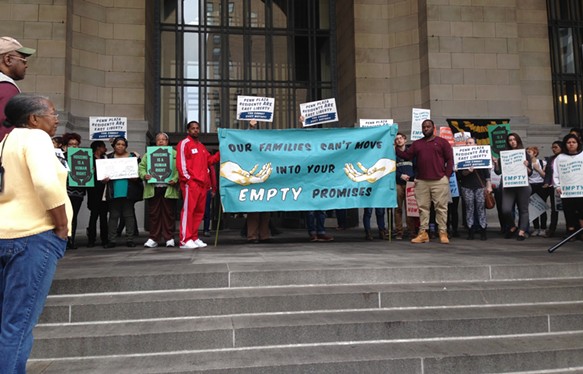
“We are living in inhumane conditions,” said Hoots to a crowd of about 80. “We are awakened by loud construction noises, and I have caught many rodents in the building.”
In 2015, Penn Plaza’s owner, LG Realty Advisors, issued 90-day eviction notices to some 300 families that lived in Penn Plaza. In response to the pending mass eviction, Pittsburgh Mayor Bill Peduto stepped in and helped negotiate a deal that led to dollars for a city affordable-housing trust fund. Also, Penn Plaza residents received relocation assistance, and LG was allowed to redevelop the property.
The first building, at 5704 Penn Ave., came down February 2016, displacing some residents, while others remained in the other building at 5600 Penn Ave. Myrtle Stern lives there and has lived at Penn Plaza for nine years. She told the crowd the owners are already doing demolition work to her building including, “digging out the ceiling and tearing up the floors.”
Randall Taylor, a former Penn Plaza resident, helped to organize the rally and was very critical of Penn Plaza’s owners, who are attempting to redevelop the property into a mixed-use development, anchored by a new Whole Foods Market and luxury apartments.
“[LG Realty] have displaced hundreds of familes, for what, a few extra dollars,” said Taylor. “We welcome new development, but not at the cost of the old residents of the neighborhood.”
LG's initial Penn Plaza redevelopment proposal was rejected by a unanimous 9-0 vote from the Pittsburgh Planning Commission and LG has appealed that decision, as well as suing the city, saying the planning commission was too hasty in its decision. Attorney Jonathan Kamin, who represents LG Realty, did not return a request for comment by press time. City Paper spotted LG principal Brian Gumberg recording the rally on his phone today, but he left the scene before the rally concluded.
Peduto’s chief of staff Kevin Acklin said he is aware of the complaints of substandard living conditions at Penn Plaza. He added that the mayor’s office sent a letter to LG on Feb. 16, requesting the owners to stop any alleged construction work on the property until all residents vacate and LG provides proof they are meeting the living standards required by the Allegheny County Health Department.
Acklin said the city will seek legal action if LG does not comply. “If [LG] doesn’t provide those assurance by the end of the day, we are tee’d up to go to court,” said Acklin at a press conference after the rally. “If they are unable to certify compliance, then we are ready to go to court to force them.”
Tags: Pittsburgh , Penn Plaza , Bill Peduto , Kevin Acklin , LG Realty Advisors , Image
Wednesday, December 14, 2016
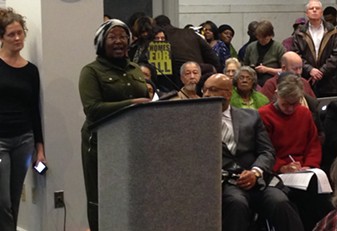
The 312 apartments that made up Penn Plaza were some of the last non-subsidized, below-market rate housing in all of East Liberty. As a result, Pittsburgh Mayor Bill Peduto stepped in and helped negotiate a deal that led to dollars for the affordable housing trust fund, Penn Plaza residents received relocation assistance and LG was allowed to redevelop the property.
Throughout this process, there have been many familiar faces: neighbors from nearby single-family homes focused on the future of Enright Park (the small public park in the center of the Penn Plaza site), housing advocates from Action United and Homes for All Pittsburgh, and developers from LG.
But at the Dec. 13 public hearing to discuss the preliminary plans for LG’s new development, which includes a controversial expansion by Whole Foods, a dozen new faces emerged, and all were from Rodman Street Missionary Baptist Church, which is located near the Larimer-East Liberty border. And while at past meetings the majority of East Liberty residents have been opposed to LG’s plans, because they say the neighborhood can’t stand to lose any more affordable units, the Rodman Street group was solidly in favor of the new development due to its contribution to East Liberty’s affordable-housing fund.
“We think this project will help us, through the affordable housing trust fund,” said Rev. Darryl T. Canady of Rodman Street to the planning commission. “We are here to support this.”
After the pastor spoke, about 12 of his parishioners, some who had lived in Penn Plaza before part of it was torn down, spoke in favor of the development and the affordable-housing trust fund. (In September 2015, the Urban Redevelopment Authority created an affordable-housing trust fund for East Liberty, which is generated from tax increments of select developments in the neighborhood. Penn Plaza was added to that list of projects when the city reached a deal with LG in late September 2015.)
However, many of the parishioners merely said they support the pastor and some called the trust fund the “affordable care trust fund.” Some opponents of the development said they felt LG was trying to "manipulate" the planning commission. And Michael David Battle, a local housing advocate, exclaimed at the meeting, “they don’t even know what [the fund] is called!”
LG’s attorney Jonathan Kamin rejects the idea that his client is unfairly manipulating the planning commission and said one group doesn’t have a monopoly on community engagement. “Our community outreach has been significant and involves talking to neighborhood groups and churches,” said Kamin. “And we’re happy to have built a consensus and support for our project.”
Before the start of the public hearing, a City Paper reporter saw LG president Lawrence Gumberg, talking to the group of parishioners and overheard the developer say, “bottom line, we get the tax break, then we contribute to the affordable housing trust fund.” After the meeting, Rev. Canady said that Gumberg approached him a “few months ago” to detail the Penn Plaza development and the affordable-housing trust fund.
East Liberty resident Arthur Allen spoke in opposition of LG’s plan at the meeting because of its lack of affordable units. He also objects to the redesign of the city-owned Enright Park. He says he believes LG is trying to manipulate the planning commission by “trying to change the tone for the entire project,” instead of meeting with residents like himself to come to a shared vision.
“It’s over a year later and we are not seeing what should take place,” said Allen after the meeting. “If you are on the planning commission, you should be able to see right through [what LG] is trying to do.”
During the meeting, Kamin outlined in detail how LG had met every obligation required by the city and said the project will contribute $10-12 million for the affordable housing trust fund over 10 years. He also said that as the development is designed right now, all of the 400 proposed units will be market-rate.
Pittsburgh Commission on Human Relations’ director Carlos Torres said generally the commission feels that future housing developments should include affordable-housing units, so they don't violate the U.S. Fair Housing Act. “Housing developments that perpetuate segregation or that effectively exclude members of protected classes cannot be found to create a favorable social impact,” said Torres in a statement released after the meeting.
But Kamin said that LG would have to acquire federal and state funds to create affordable units, which they are not currently seeking. According to the agreement forged between the city and LG in 2015, LG is not required to include affordable units in their new development.
The public hearing lasted more than four hours, with more than 40 people speaking. Because the meeting was so contentious, the planning commission decided to delay the vote until next month. Planning Commission Chair Christine Mondor said the vote could take place either Jan. 10, 2017 or Jan. 24. Check the planning commission website for up-to-date information.
Tags: Penn Plaza , LG Realty , Pittsburgh Planning Commision , Rodman Street Missionary Baptist Church , East Liberty , Image
Wednesday, December 7, 2016
“We are happy to invest millions of dollars into this neighborhood,” said Jason Lardo, owner of ICON Development, which is financing and rehabbing an old factory. “It's beautiful for the neighborhood to embrace us.”
Lardo, who spoke at Dec. 6 groundbreaking event complete with live jazz and a cocktail bar, said that six of the 18 units have already sold, and that most of the buyers are from a younger crowd. Bloomfield Lofts offers condos for sale ranging from $269,000 to $451,000. Add in up to $324 in monthly homeowner’s-association fees, and these units are sure to become some of the most expensive homes in Bloomfield. According to U.S. Census figures, the average home price in the section of Bloomfield where the lofts will be built was $139,000 in 2014, up from $87,000 in 2010.
The building, on Cypress Street, sat vacant for more than 20 years and previously housed a laundry company. Pittsburgh Mayor Bill Peduto was happy that some investment was coming to the neighborhood and that the building was being repurposed instead of torn down.
“When you look at a project like this, you can see its history,” said Peduto at the event. “It’s great this building could find a new way to accomplish an adaptive reuse.”
However, the new luxury condos also contribute to Pittsburgh’s upscale-apartment boom that has increased rents throughout the city, especially in Lawrenceville and East Liberty, driving longtime low-income residents into the suburbs. (Bloomfield had largely avoided upscale development over the years, but still saw its average rent rise from $642 in 2010 to $875 in 2014, according to Census figures.)
The Bloomfield Lofts are pure market-rate housing, and don’t have any affordable-housing components. Peduto said that in the future he would like to see new housing developments like these include affordable units, but said those require different financing structures where developers seek government subsidies.
But Peduto said projects like Bloomfield Lofts can help keep some other rents down, since Bloomfield has experienced demand (the population has grown slightly over the years, according to the Census) and new units help to grow the housing stock instead of putting more pressure on a limited number of homes.
Tags: Bloomfield , ICON Development , Bill Peduto , housing , Image
Friday, November 11, 2016
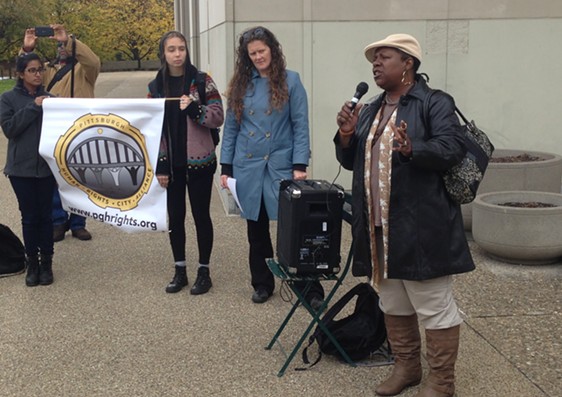
"We need to fundamentally change the whole discourse on housing and human rights," said summit organizer and Pitt professor Jackie Smith. "We need to build it up from the grassroots, not the top down."
Speakers at the rally focused on topics like ensuring that decent affordable housing was located in places with good public-transit access and rethinking the criteria that qualifies neighborhoods for subsidized housing. One topic that resonated with the crowd was giving control on housing decisions directly to the community, instead of putting it in the hands of landlords and developers.
"As more and more people become renters, we need to be able to expand renters' rights," said Malcolm Terrejón Chu of the National Homes for All Coalition. "It's not just about affordable housing, it's about permanent decisions on housing [being] controlled by the community."
After the rally, attendees hopped on a bus tour that took them to the Hill District, the North Side, Beechview and East Liberty to see Pittsburgh's affordable-housing stories first hand.
Mischelle McMillan, of local housing advocates Action United, has been advocating for better housing in the Mon Valley and Pittsburgh for years. She said that housing is not a privilege, it is a "God-given" right, and the city has a ways to go in terms of having a wide-ranging housing stock with good living conditions.
"I am disappointed with Pittsburgh," said McMillan. "We have too many landlords that are allowing us to live in deplorable conditions."
Rob Robinson, of the National Economic and Social Rights Initiative, spoke at the rally about the importance of renters speaking up for themselves. According to an August 2016 study, put out by apartment-search website Apartment List, renters are less likely to vote than homeowners, 58 percent to 72 percent respectively. "If you want human rights, you are going to have to take them," said Robinson.
A full slate of workshops are scheduled for tomorrow, Nov. 12, at the Frick Fine Arts Center in Oakland, as part of the Housing Summit. The summit is free to attend, but organizers ask that attendees register.
Tags: National Homes for All Coalition , Human Rights City Alliance , University of Pittsburgh , Image
Thursday, September 22, 2016
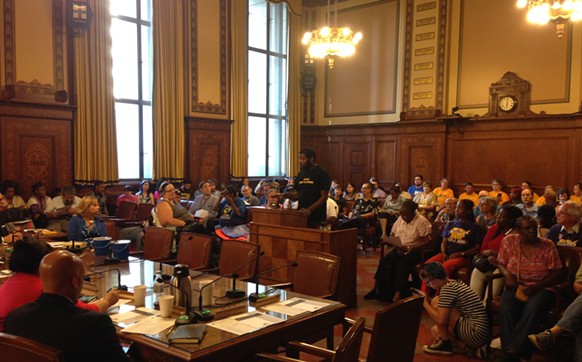
“We want this trust fund to go through,” said Richard Morris, chair of the city’s Committee on Human Relations. “If we leave it up to the banks, [affordable-housing growth] will not happen.”
Most in the crowd of around 200 held up signs reading “Housing is a human right” and voiced support for the fund, saying it was necessary to curb gentrification in some Pittsburgh neighborhoods. Joshua Malloy lives in East Liberty and says that even his wage of $13 an hour is not enough to live in the new apartments in the neighborhood. He says if he is forced to move to a place like Penn Hills, his access to public transportation will be severely cut.
“Whenever those who can no longer afford to live in their homes, where do they go?” asked Malloy. “We need this [fund].”
Many in the crowd also requested that low-income residents be part of advisory boards for the housing fund; that transit access continue to be a priority; and that policies such as inclusionary zoning (where new developers are required to include percentages of affordability) be considered.
But a few in the crowd voiced displeasure over the proposed manner that the funds would be raised. Charlene Haislip, a local real-estate agent, said she supported more affordable-housing efforts, but said raising the real-estate transfer tax would put a burden on people looking to purchase homes in the city. “We don’t believe that increasing the cost of buying a home is the answer to making housing more affordable” said Haislip.
Helen Gerhardt, who was representing housing-activism group Homes for All, said she strongly supported the housing fund. She said raising local funds could contribute to a discrepancy in federal funds for rental-housing assistance. (In 2015, the federal government contributed around $130 billion toward subsidies for home ownership and only around $40 billion for rental subsidies, according to the Center on Budget and Policy Priorities.)
Advocates gathered 13,000 signatures to put the creation of the fund to a vote as a ballot initiative this November, but decided in August to let council handle the matter instead. City Council President Bruce Kraus (D-South Side) pledged at the meeting that a vote to create the Housing Opportunity Fund would happen before the end of 2016.
Tags: Pittsburgh City Council , Housing Opportunity Fund , Bruce Kraus , Keeping Up With the Council , Image
Tuesday, August 2, 2016
Pittsburgh is the first stop for millennials looking to raise awareness of affordable-housing issues
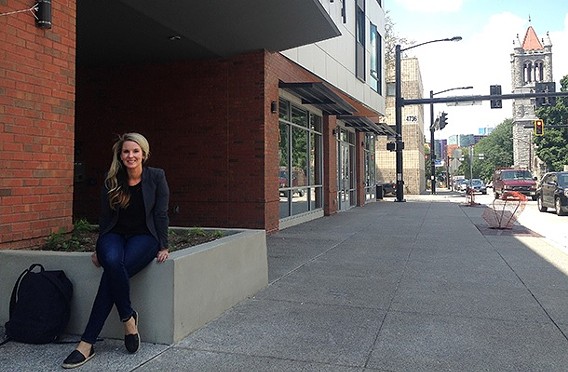
“It was deeply poetic watching the cranes among the ruins of the building,” said Carroll. “Penn Plaza is a vignette for what is happening in cities now, all across the country.”
It’s stories like Penn Plaza that drew Carroll to visit Pittsburgh, as part of the Millennial Trains Project, which sponsors young representatives, with contributions from national affordable-housing group Make Room, to visit American cities by train and discuss how issues like affordable housing, inequality and transit access are affecting communities.
“This is an opportunity for millennials to explore the country by train, and speak about the issues that people are interested in,” said Carroll.
And the issues that are important to Carroll are affordable housing and public transportation, which she says are inextricably linked. Carroll explains that when transit investment comes to a neighborhood, the nearby property values rise, thus pushing out the low-income residents that rely most heavily on public transportation. Pittsburghers see this happening in East Liberty near the busway stop, but Carroll says this is common in many American cities.
“In Albuquerque, they are building a new [Bus Rapid Transit] line, and the mayor there says that nearby values have already gone up by 12 percent,” said Carroll.
She is visiting Albuquerque as part of her train tour, as well as Chicago, Kansas City and Los Angeles, to meet with local leaders and discuss affordable-housing successes and failures.
Carroll is also an elected commissioner for southwest Washington, D.C., which is also experiencing affordable-housing problems. “My neighborhood in D.C. is changing quickly,” said Carroll. “Over the next few years, we will see $5 billion in private investment.” In response, Carroll advocated for a build-first policy that would make sure affordable housing is replaced before old units are demolished, allowing low-income residents to stay in the neighborhood. She said the Washington, D.C. housing authority and mayor recently OKed a build-first policy.
It’s these proactive policies that Carroll will be advocating for on her five-city tour. “Once those [property] values go up, it’s so difficult to put in affordable housing — it’s too expensive,” said Carroll. “We have to do it at the start. It has to be backed in.”
While she applauds some of the recent steps to address affordable housing in Pittsburgh, Carroll said that setting strict rules now will be important if and when Pittsburgh receives a population influx from bigger-city residents looking to Pittsburgh as a cheaper option.
Carroll said that although the affordable-housing crisis hasn’t quite grabbed the attention of national politicians, the goal of her trip is to “raise awareness by bringing the conversation of the rental-housing crisis to the national forefront.”
She also hopes to inspire communities to take on their affordable-housing problems themselves.
“The political will comes from the voters,” said Carroll. “Voters have to demand it. The priority has to come from the community.”
Pittsburghers may have a chance to do just that. A petition drive led by labor-coalition Pittsburgh United has garnered more than the 8,000 signatures necessary to place a ballot initiative to fund a $10 million affordable-housing trust fund this November. The initiative calls for a raise in the city’s realty-transfer tax. City officials are looking into alternate ways to raise money for the fund.
Tags: Pittsburgh , East Liberty , Penn Plaza , Millennial , Image


